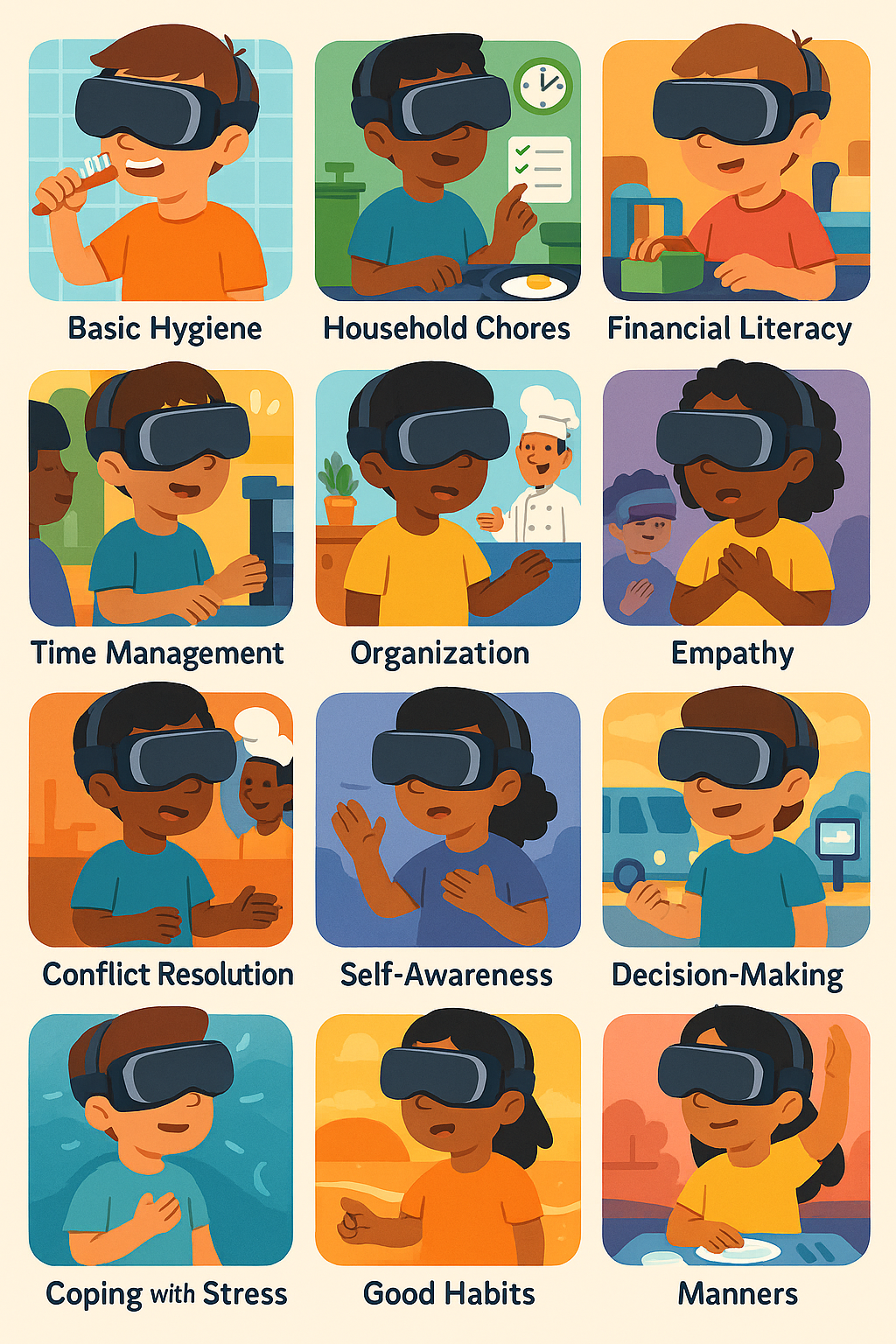
Life Skills Through Virtual Reality
Helping Kids Build Confidence, Independence, and Emotional Strength
Virtual Reality (VR) isn’t just for games — it’s a powerful tool for teaching kids the practical, emotional, and social skills they need to succeed in life. By immersing children in safe, interactive environments, VR allows them to practice skills over and over until they become second nature.
Basic Hygiene
Description: Showering, brushing teeth, washing hands, and dressing appropriately.
How VR Helps: In VR, kids can explore a simulated bathroom environment and follow guided routines for personal care. Timers, animations, and friendly reminders help them learn proper hygiene techniques in a fun way.
Benefit: Encourages independence, reinforces healthy habits, and makes daily routines engaging.
Household Chores
Description: Cleaning, doing laundry, tidying rooms.
How VR Helps: Gamified VR tasks guide kids through sorting laundry, vacuuming floors, dusting shelves, and washing dishes. They learn step-by-step while earning rewards for efficiency and accuracy.
Benefit: Builds responsibility, teaches essential home skills, and improves task completion.
Cooking
Description: Basic food preparation and safe kitchen use.
How VR Helps: VR kitchens allow kids to practice measuring ingredients, following recipes, and safely handling cooking tools. They can prepare dishes without the dangers of a real kitchen.
Benefit: Fosters confidence, promotes healthy eating habits, and builds independence.
Financial Literacy
Description: Saving, budgeting, and spending wisely.
How VR Helps: Kids earn virtual currency through tasks and learn to manage it in simulated stores. They practice comparing prices, making purchases, and saving for bigger goals.
Benefit: Teaches money management, decision-making, and financial responsibility.
Time Management
Description: Prioritizing tasks and sticking to schedules.
How VR Helps: In VR, kids play scenarios where they must balance homework, chores, and free time. They learn to create schedules and adapt when unexpected events occur.
Benefit: Improves punctuality, prioritization, and planning skills.
Organization
Description: Keeping belongings tidy and using planners effectively.
How VR Helps: VR challenges kids to organize virtual rooms, backpacks, and digital planners. They get points for tidiness and time efficiency.
Benefit: Encourages structured thinking and responsibility.
Communication
Description: Expressing thoughts clearly and understanding others.
How VR Helps: Role-play in VR allows kids to practice ordering at restaurants, introducing themselves, and having everyday conversations, with feedback on body language and tone.
Benefit: Strengthens verbal, nonverbal, and listening skills.
Empathy
Description: Understanding others’ feelings and perspectives.
How VR Helps: VR perspective-taking experiences let kids see the world from someone else’s point of view, such as a peer with different abilities or challenges.
Benefit: Builds compassion, respect, and emotional intelligence.
Conflict Resolution
Description: Resolving disagreements constructively.
How VR Helps: VR scenarios place kids in common disputes, like sharing toys or group decisions, where they must choose peaceful and fair solutions.
Benefit: Teaches negotiation, compromise, and problem-solving.
Resilience
Description: Bouncing back after setbacks.
How VR Helps: In VR games, challenges are designed to include setbacks. Kids learn to try again after failure and find alternative solutions.
Benefit: Promotes perseverance, adaptability, and confidence.
Self-Awareness
Description: Recognizing emotions, strengths, and weaknesses.
How VR Helps: After completing VR activities, kids reflect on their actions, identifying strengths and areas for growth.
Benefit: Improves self-reflection and personal development.
Decision-Making
Description: Choosing wisely after weighing options.
How VR Helps: Choice-driven VR stories present branching outcomes. Kids see the consequences of their decisions in real-time.
Benefit: Strengthens critical thinking and responsibility.
Coping with Stress
Description: Staying calm during difficult times.
How VR Helps: VR offers calming virtual environments with guided breathing, mindfulness, and relaxation activities.
Benefit: Helps manage anxiety and develop healthy coping mechanisms.
Manners
Description: Using polite language and showing respect.
How VR Helps: Interactive VR lessons teach greeting guests, dining etiquette, and expressing gratitude.
Benefit: Encourages social courtesy and respectfulness.
Good Habits
Description: Maintaining healthy daily routines.
How VR Helps: Habit-building VR programs reward kids for consistent actions like exercising, reading, or showing gratitude.
Benefit: Instills lifelong wellness practices and discipline.
